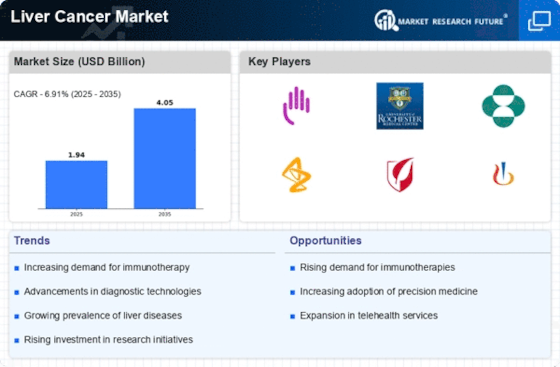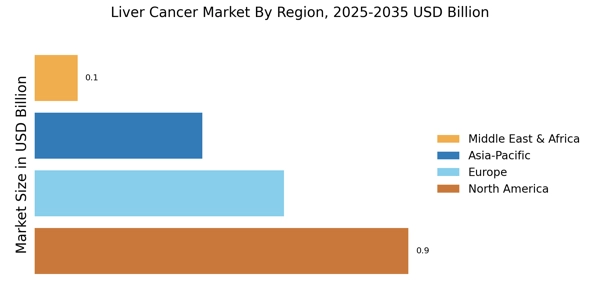Advancements in Treatment Modalities
Innovations in treatment modalities are significantly influencing the Liver Cancer Market. The development of targeted therapies and immunotherapies has transformed the treatment landscape, offering new hope for patients. For instance, the introduction of sorafenib and regorafenib has provided effective options for advanced liver cancer. Furthermore, ongoing clinical trials are exploring novel agents that may enhance treatment efficacy. The market is expected to witness substantial growth as these advancements become more widely adopted. As a result, pharmaceutical companies are increasingly investing in research and development to bring forth new therapies, thereby driving the Liver Cancer Market forward.
Increasing Incidence of Liver Cancer
The rising incidence of liver cancer is a primary driver of the Liver Cancer Market. According to recent statistics, liver cancer cases have been steadily increasing, with an estimated 1 million new cases projected by 2025. This surge is attributed to various factors, including the prevalence of hepatitis B and C infections, alcohol consumption, and obesity. As awareness of liver cancer grows, healthcare systems are compelled to enhance their diagnostic and treatment capabilities. Consequently, this trend is likely to stimulate demand for innovative therapies and technologies within the Liver Cancer Market, as stakeholders seek to address the escalating burden of this disease.
Rising Awareness and Screening Programs
The growing awareness of liver cancer and the implementation of screening programs are pivotal in shaping the Liver Cancer Market. Public health initiatives aimed at educating populations about risk factors and symptoms are leading to earlier detection and treatment. Countries are increasingly adopting screening protocols, particularly for high-risk groups, which is likely to enhance patient outcomes. This proactive approach not only improves survival rates but also drives demand for diagnostic tools and treatment options. As awareness continues to rise, the Liver Cancer Market is expected to expand, with stakeholders focusing on developing effective screening methodologies.
Regulatory Support for Innovative Therapies
Regulatory bodies are increasingly supporting the development of innovative therapies for liver cancer, which is a crucial driver for the Liver Cancer Market. Initiatives such as expedited approval processes for breakthrough therapies are encouraging pharmaceutical companies to invest in research and development. This regulatory environment fosters innovation, allowing for the rapid introduction of new treatment options. As a result, the market is likely to experience a surge in novel therapies that address unmet medical needs. The collaboration between regulatory agencies and industry stakeholders is essential for advancing the Liver Cancer Market and improving patient care.
Growing Investment in Healthcare Infrastructure
The expansion of healthcare infrastructure is a significant factor influencing the Liver Cancer Market. As countries invest in healthcare systems, there is an increased capacity for cancer treatment and management. This investment includes the establishment of specialized cancer centers and the enhancement of diagnostic facilities. Improved access to healthcare services is likely to facilitate early diagnosis and treatment of liver cancer, ultimately leading to better patient outcomes. Furthermore, as healthcare systems evolve, there is a growing emphasis on integrating advanced technologies into treatment protocols, which will further drive the Liver Cancer Market.

















